Dystopia as catharsis
Mihai Grecu, born in 1981, Romania, Visual Artists, Video Artist.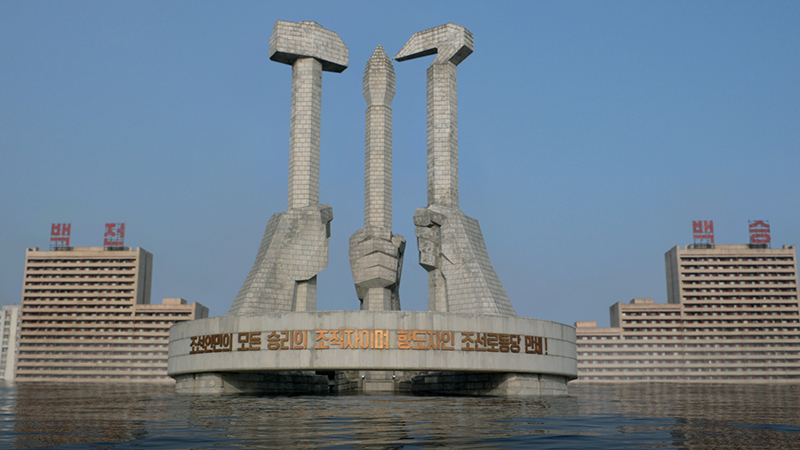
Marteu, 2020. Courtesy of the artist.
His oeuvre is characterized by a unique ductus, which takes the viewer into a world of mostly dystopian audio-visual scenarios. He not only creates those, constructed from symbolic figures and architecture, but also places them in a different context, which inevitably raises questions about reality and plausibility. As, for example, in his current artistic engagement with Kim Jong-un.
Art Claims Impulse is very happy to welcome him now in our gallery.
*ACI = Abbreviation for Art Claims Impulse
ACI: Hi Mihai, we hope you are well and healthy. In this current pandemic situation, the wish of being healthy becomes very relevant these days. How does Corona affect your life as an artist?
Mihai Grecu: My work has always been connected to the topics such as catastrophe, dystopia, etc. When I first witnessed the spreading of the coronavirus, it was getting very weird, like a living nightmare: I could literally see elements coming from dystopian visions taking over reality, including politics, public life, etc. So, it was quite astonishing to witness all this taking place at a global level. How did it affect me personally: My daily life wasn't that much affected after all since I usually avoid to crowded places and I've been always washing hands intensively; The most significant impact I experienced was the shift, or the change regarding human relations.
It also had and has a huge impact from a technical perspective because I was planning to have a big project that public filming involved. It is a part of a new project, that was planned in Romania for April 2020, but everything got postponed. Many elements of my shooting plans must be rethought, since coronavirus will probably not disappear in the near future.
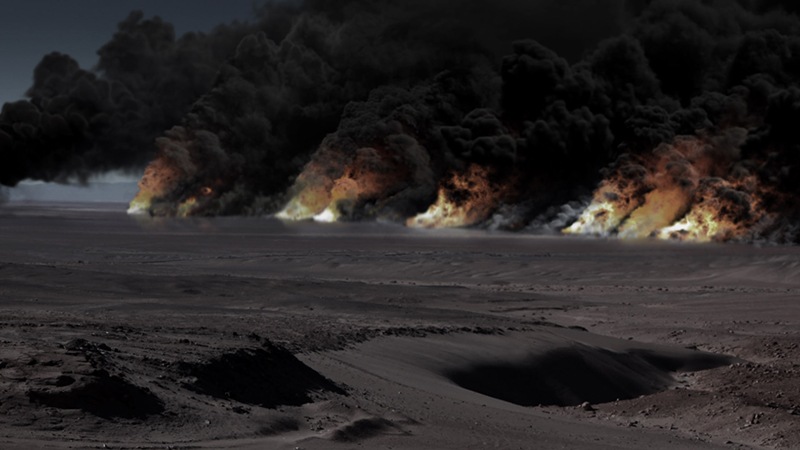
Burned Field, 2015, courtesy of the artist
ACI: In our prior conversation you mentioned: “With my artistic creations I try to picture hidden versions of the world, possible futures and distorted realities.” This is exciting, do you think that this is only possible through art, and to what extent would you see your approach as a contemporary political act, if at all?
Mihai Grecu: I think that different possible futures can be described through art and other mediums like literature, for example. My approach is to use technic to transform these visions into images that the eye can see and the mind can recognize as such, hidden dimensions of reality. I don't necessarily create images with a political purpose, but they become political whenever they are released to an audience. Any image consisting of re-evaluating and distorting the present and its current social function inevitably becomes a political act.
ACI: We also spoke about aesthetics in our last conversation and you replied that you would like to create hyper realistic visions of impossible events and places. Thinking about your current artistic debate about Kim Jong-un, where does this fascination come from and why did you select in e.g. in “Red Water”, 2020 (Large-Scale Fine Art Print Image) these aesthetics that differ slightly from your past aesthetical approach?
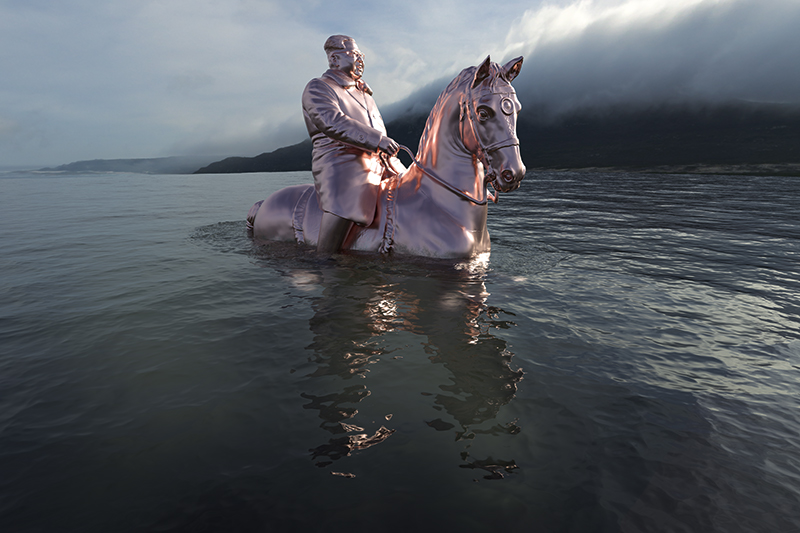
Red Water, 2020. Courtesy of the artist.
Mihai Grecu: I grew up during the last years of Ceausescu's dictatorship in Romania, when his personality cult was reaching its extremes. So the first "media '' images that I was in contact with consisted basically of 99 percent Ceuasecu. Furthermore, he was hanging out with his "friends" for example Mobutu, who's entire name I had to memorize for elementary school. I never forgot his full name; I am still able to recite it even at 3am: Mobutu Sese Seko Kuku Ngbendu Wa Za Banga.
Another state leader who had an important role in my memories of that time was Kim Il Sung, the grandfather of the current Kim. After most of this Stalinist type images of propaganda personality cult disappeared with the fall of the Soviet Union and the end of the Cold War, I found myself attentively following what's happening in North Korea, and was very astonished that it still keeps going on. It is like a "conceptual island" of my past that I remember from my early childhood. I believe this is one of the major reasons why I am very fascinated when it comes to Kim's dynasty propaganda imagery and self-imagery. These Stalinists type propaganda aesthetics are in my opinion just a continuation of my previous works.
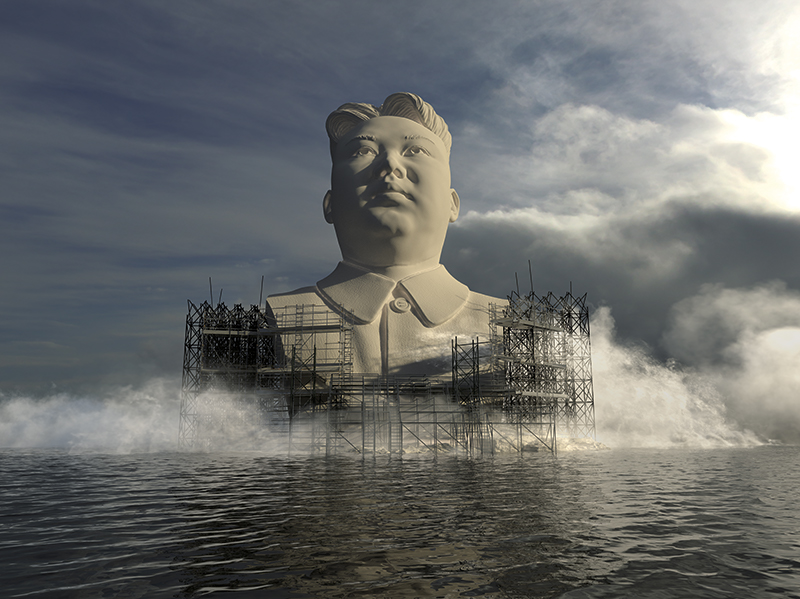
Statue, 2020, courtesy of the artist
ACI: Your latest work Saturnism, (Virtual Reality Artwork), inspired by the Saturn Mythology, we can clearly see a new artistic discussion that now includes a so called “old master” debate of antic mythologies. What is your motivation, is this the start of a new chapter?
Mihai Grecu: Goya's "Saturn" is another image that was haunting me for a long time. This particular work comes from my wish to make a virtual reality recreation of an "old masters" painting, therefore I chose "Saturn". I spent several months face to face with its reproduction. I tried to go beyond every layer and imagined for every space in the painting what was going on. Even if it looks like a very different work from what i usually do, I think it's connected to all projects I have done so far... at least on the conceptual side. My main aim was to use the Virtual Reality medium as it should be used in my opinion: To create an almost physical / real environment for the viewer: It should be a raw and unsettling physical experience.
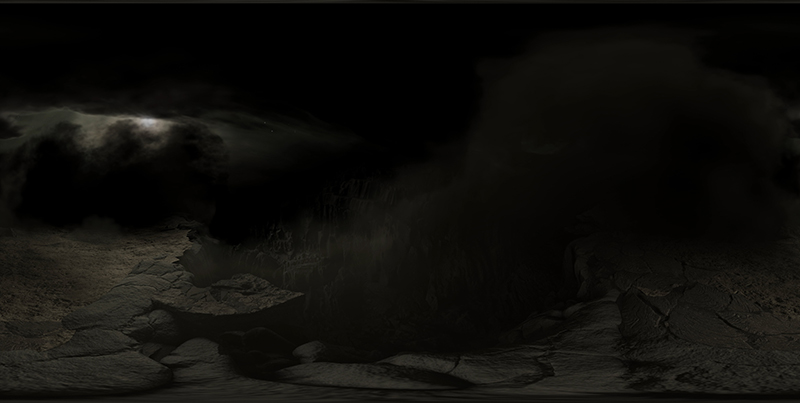
Saturnism, 2019, Excerpt from VR-Installation. Courtesy of the artist.
ACI: In our pre-conversation you mentioned your current interested in Post-Truth. Where does this interest come from? How can art be a tool to discuss this topic of Post-Truth given the fact that you create, according your artistic ability a completely detached artificial scenario in accordance with artistic freedom and thus subject to their own dynamics, namely those of the artist?
Mihai Grecu: The interest in post truth comes from the idea of rewriting history. We live in a world where post-reality has become almost as important as reality. We live in a world where fake news influences people almost to the same level than "real" news. So the question is: if there are more people who are ready to accept a false fact as "reality" than people who are willing to check the information from scientific sources, does that make the "fake" as "real" as a certified fact? Look, for example during this coronavirus pandemic, in Romania there are statistically more people willing to believe things like "the coronavirus doesn't exist, it's a conspiracy" or "it is engineered by foreign agents so they can take away Romania's wealth" etc, than people who accept that there is new virus strain and a new disease which is very contagious. And with their numbers, these people who want to believe all kind of "fake news" they become more and more numerous as they convince others of their version of the "truth", so statistically fake news and post-truth become more and more of a fact. New media makes it even easier, thanks to new technical achievements, e.g. "neural networks" or thanks to collective human work, the "Russian Facebook trolls" .
My idea is that "post truth" is not an artist statement already by default, but it's a media in itself, and I am willing to use this media in creating artworks. Some of past performances and documentary films were already carry this "germs" of post truth which we are now living in. The difference is that nowadays, it has become so big that it's taking over a big part of society and it's not directly related to a artistic creation.
Coming back to the first idea, I'm interested in post truth because I think today it is very easy to manipulate and rewrite history: Maybe in 50 years some of this "fake news" that we have now will become historical facts.
In my opinion, fake news and post-truths somehow mixes itself with the concepts of propaganda and one-sided history that have reached their climax in totalitarian regimes (like Stalinism, or North Korea), but with the difference that now it has become global and a lot more multi-facetted. It is the perfect time to include these techniques into artworks.
ACI: Mihai Grecu, thank you for this very interesting interview.